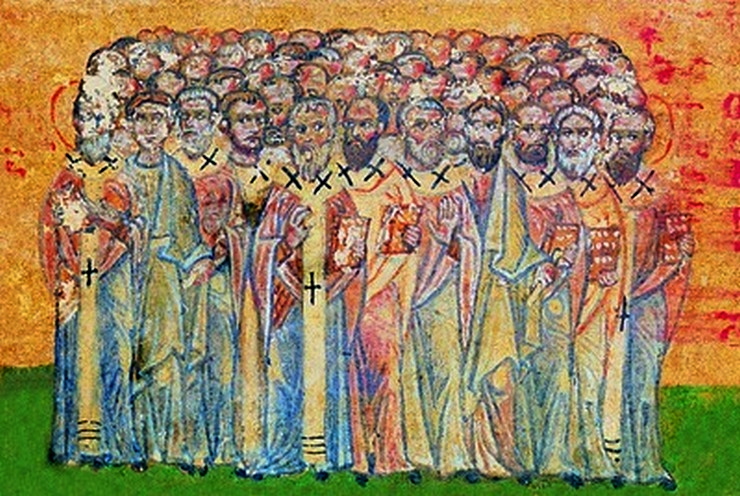The Return of the Seventy-Two
Luke 10:17-20
17 The seventy-two returned with joy, saying, “Lord, even the demons are subject to us in your name!” 18 And he said to them, “I saw Satan fall like lightning from heaven. 19 Behold, I have given you authority to tread on serpents and scorpions, and over all the power of the enemy, and nothing shall hurt you. 20 Nevertheless, do not rejoice in this, that the spirits are subject to you, but rejoice that your names are written in heaven.”
Observations and Reflections
 As with the sending of the 72, the returning of the 72 could have been 70 depending on one’s translation into English. However, the critical point with the number is that it’s representing all the nations of the earth, as explained by the generations of Noah, in Genesis 10.
As with the sending of the 72, the returning of the 72 could have been 70 depending on one’s translation into English. However, the critical point with the number is that it’s representing all the nations of the earth, as explained by the generations of Noah, in Genesis 10.
The events that took place while the 72 were on mission must have been incredible, as they returned all jazzed up and excited about the power of Jesus’ name. However, Jesus want’s them to remember that even though they were gifted with great power, it is not the goal of the Christian to have powers. The goal is to enter the kingdom of heaven and be eternally in the love of the father.
Theologically, this passage has another verse that needs to be correctly understood, which is when Jesus describes Satan falling. What does it mean when Jesus states the following?
I saw Satan fall like lightning from heaven.
Was this a reference to a previous event or while the disciples were out? I would contend that Jesus was referring to an end-times type of event. This would place Satan falling in the future. How does this make any sense given that the English translation used a past-tense verb (saw)? The verb for fall was in the aorist participle form which indicates no real time period. Moreover, the idea of Satan falling was a readily available image in Jesus’ day, as a number of Jewish writings promoted such an idea of Satan falling in the end times, such as the War Scroll from Qumran.
The most closely related to this passage is probably the pseudepigraphic Testament of Solomon, which depicts demons talking to Solomon and say such things as the follow.
we demons fly about in the air; and we hear the voices of the heavenly beings, and survey all the powers. And as having no ground (basis) on which to alight and rest, we lose strength and fall off like leaves from trees. And men seeing us imagine that the stars are falling from heaven. But it is not really so, O king; but we fall because of our weakness, and because we have nowhere anything to lay hold of; and so we fall down like lightnings3 in the depth of night and suddenly. (Testament of Solomon 20)
It is hard to know if texts like the Testament of Solomon influenced Luke or not, especially since it appears to have been written between the crucifixion and writing of Luke’s gospel, which means it was not exactly a “classic” of Jewish culture yet. It was however, an adaptation of common Jewish apocalyptic thinking.
So, what is the takeaway from this phrase by Jesus? I would suggest that by proclaiming the good news in power, we are placing the nails in the devil’s coffin.
 There is cause for celebration in this passage. The disciples were able to successfully spread God’s word and enact God’s authority of everything including demons and evil spirits. They are rejoicing because they were able to experience God’s work in their lives and see it being put on display.
There is cause for celebration in this passage. The disciples were able to successfully spread God’s word and enact God’s authority of everything including demons and evil spirits. They are rejoicing because they were able to experience God’s work in their lives and see it being put on display.
However, Jesus wants them to find joy in so much more then their victory in doing His work. They are only able to do this work because they are children of God and have an ongoing relationship with Jesus Christ. Their eternal security is in heaven and its for this reason that they should rejoice.
Spreading the Gospel ought to serve us as a reminder of what God has done in our own lives and what He is using us to do in the lives of others. Jesus reminds them of this fact because it is also a tool to help keep His followers humble and their eyes focused on Christ and not their own strength.
[Featured image called “70 apostolov” (miniature in the Georgian Georgian paintings, XV century)]
